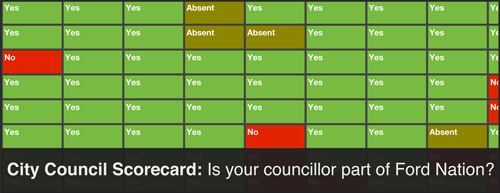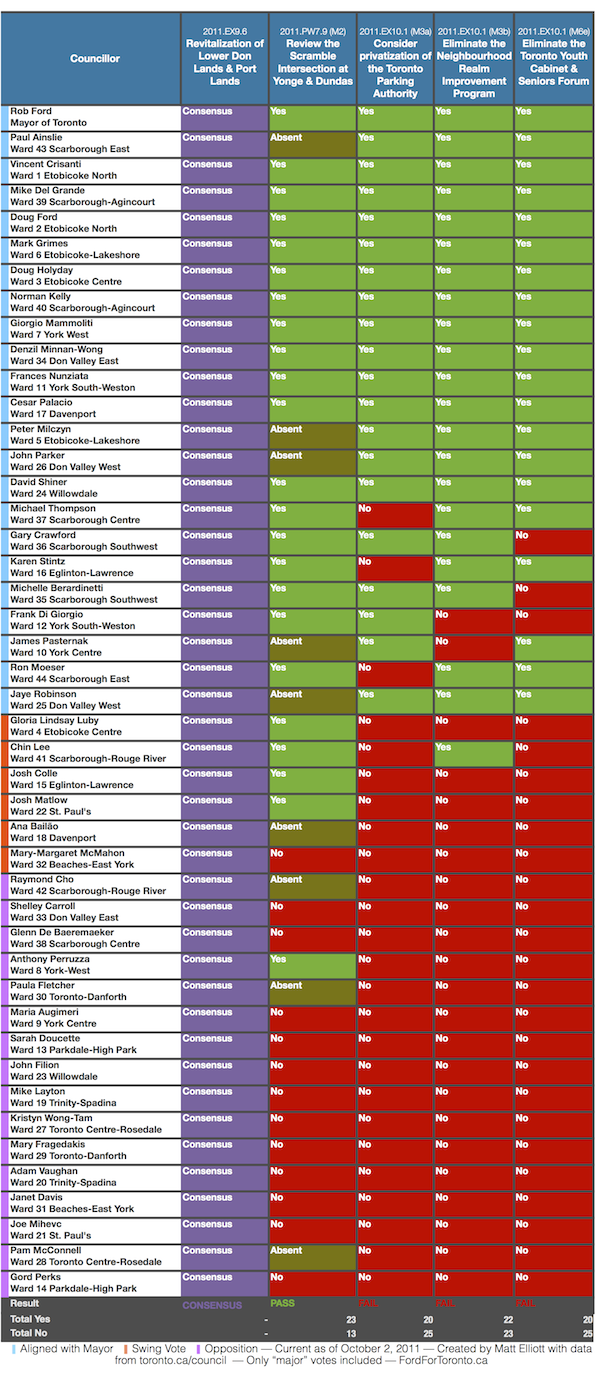October 2, 2011:Â Download (PDF)Â -Â Download (PNG)Â -Â Google Docs
This one’s big. I’ve added new votes to the City Council Scorecard, covering items from the regular city council meeting on September 21 and the special meeting related to the Core Service Review on September 26. Of the ten votes added, the mayor came out on the losing end of five of them. One councillor, Gloria Lindsay Luby, saw her Ford Nation percentage — the metric that tells us how often councillors vote with the mayor on major items — drop from 87.5% to 68% over these two council meetings. Most councillors also saw their Fordiness level drop, with two members of Ford’s Executive Committee — Michael Thompson and David Shiner — dropping out of the 100% loyalist club on votes relating to the Christmas Bureau and Community Environment Days, respectively.
It’s possible to both overstate and understate the impact of these numbers.
New Votes
- EX9.6 — The item relating to the revitalization of the Lower Don Lands & Port Lands. What a saga this was. A more charitable blogger would describe this “consensus” outcome as a win for all involved, but that blogger isn’t me. This was a huge, resounding loss for the mayor, his brother and the strategists working behind the scenes who are doing what they can to come up with a list of publicly-owned assets to sell. Because the mayor’s side blinked before this item could go to council in its original form, I’ve scored the result differently than other votes, using a snazzy purple. It doesn’t count either way toward the overall Ford Nation percentages.
- PW7.9, Motion 2 — Earlier this month, as part of what would appear to be a thorough quest to rid Toronto of the pedestrian and cycling infrastructure that bothers him on his drive to work, Councillor Denzil Minnan-Wong called for a review of the scramble intersection at Yonge & Dundas. The request for a study was tacked on to Minnan-Wong’s downtown traffic study — something worth being wary of — and was made without consulting the local councillor beforehand. This is becoming a pattern. Motion 2 was an amendment by Councillor Gord Perks that asked  that the city not bother with a study of the pedestrian scramble. It failed.
- EX10.1, Motion 3A — Councillor Gloria Lindsay Luby had a public break-up with the Ford administration last week, voting against several items relating to the Core Service Review. She also moved several amendments that resulted in some of the mayor’s most significant losses yet. This motion by Luby exempted any consideration of privatizing the Toronto Parking Authority — a revenue-generating asset — from this year’s budget process. Her motion carried, despite an attempt to whip the vote down by the mayor’s staff, and the TPA is saved. Hard to say whether the outcome was borne out of a desire to maintain TPA revenues or simply because councillors know how much their residents value cheap parking.
- EX10.1, Motion 3BÂ — Another Luby motion, this reversed a KPMG recommendation that would see the elimination of the Public Realm Neighbourhood Improvement Program. The program is a big hit with local businesses and neighbourhood groups, and little analysis was done to measure the potential economic drawbacks from killing the program. A very closed vote — once again whipped by the mayor — that saw Team Ford lose due to renegade runs by James Pasternak and Frank Di Giorgio.
- EX10.1, Motion 6AÂ — It’s not easy to get politicians to vote against seniors or kids. This motion by Josh Matlow preserved the Toronto Youth Cabinet and the Toronto Seniors Forum, both of which had been targeted for cuts. They’re both committees that allow underrepresented populations to engage themselves further in policy and politics. It’s worth noting that the initial wording of Matlow’s motion was stronger — it stipulated that the two committees should be saved outright — but was later made softer, so that now the future of both groups will be considered by the budget committee. This was also a whipped vote, with the mayor overturned thanks to rebel button pushes by Gary Crawford, Michelle Berardinetti and Frank Di Giorgio.
- EX10.1, Motion 7A — This Ana Bailão motion saved Community Environment Days from the chopping block. They were identified as non-core by the KPMG study, and have been criticized in the past for being forums for councillors to promote themselves in their community. But they also bring in tonnes of recyclables and hazardous waste, which might otherwise get dumped on the street somewhere. As above, the vote was whipped, but Pasternak and — surprisingly — David Shiner went against the cheat sheet.
- EX10.1, Motion 11Â — Councillor Mary Fragedakis’ attempt to save Christmas — or, at least, the publicly-funded bureau that distributes gifts to the needy in December — failed on a 25-20 vote, despite a somewhat-surprising show of support from Ford ally Michael Thompson. Apparently the city will seek to continue the work of the Christmas bureau through partnerships with not-for-profit groups.
- EX10.1, Motion 16AÂ — This amendment by Councillor Maria Augimeri would have protected the Hardship Fund — a set of social supports available to low-income residents, created in the face of provincial cutbacks to welfare and other social programs in the Harris era — from further consideration as a 2012 budget cut. It barely passed, 23-22, with Councillor Jaye Robinson in dissent.
- EX10.1, Recommendation 2BÂ — KPMG recommend the city look at selling off — or closing — the three theatres it owns. Council opted to move forward with that recommendation in a close vote. Councillor Gary Crawford was later unveiled as the new chair of a task force dedicated to determining the future of these theatres.
- EX10.1, Recommendation 7Â — In another KPMG recommendation, the consulting firmed suggested that the city stop planting so many damn trees. (We’ve been told they don’t employ anybody.) The city had a rather ambitious plan to expand the tree canopy across the city — something that not only can work to make people happier but can also reduce the risk of illness — but councillors opted to pare it back with this recommendation in a close vote. (Note: Based on a previous vote relating to this item, I’m pretty sure Councillor Raymond Cho’s vote on this item was a mistake. If anyone can confirm, let me know and I’ll add a footnote.)
Trend Watch
The big news is the general downward trend, as the mayor’s council support gets nibbled away. As mentioned, Councillor Lindsay Luby dropped 19.5 points, falling below the arbitrary 70% threshold, so I’ve switched her from the blue team to the orange team. Middle Councillor Josh Matlow dropped 12%, while Mary-Margaret McMahon dropped 14%. Ana Bailão dropped eight points. While Rob Ford, all in all, still seems pretty effective at marshalling support amongst right-leaning councillors, the centrist bloc — which started the term sympathetic to the mayor’s agenda — has rapidly jumped off the bandwagon.
How to overstate this: Rob Ford is totally screwed. There’s no way he can maintain control of council going forward. A day of reckoning is at hand.
How to understate this: Nothing really changed. Rob Ford still got the most critical parts of the service review past council, not to mention the new user fee policy and voluntary separation program. They’ve still got the votes when they need them.
The pivotal change we’re likely to see coming out of this is a note of caution coming from the mayor’s office. Whereas the last few months have been marked by a series of chest-beating displays of power, they’d be smart to tread more softly from here on out, as they’re really only one wavering ally away from losing votes on key items.
Batting Average
For those who love baseball — or are even vaguely familiar with the idea of baseball — I’ve added a ‘batting average’ stat to the full version of the scorecard. This lays out, as a percentage, how successful the mayor has been at winning major votes. The mayor’s batting average stands at 70%. (Or, if you’re so inclined, .700.) Prior to the September council meetings, it was 80%.
Questions
Questions about the Council Scorecard? Read my notes on methodology. Also, you can email me.
Tags: city council scorecard


